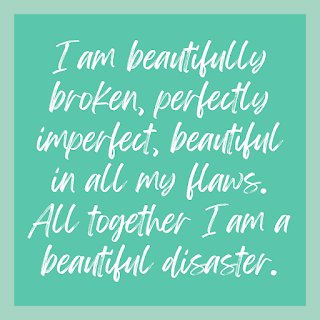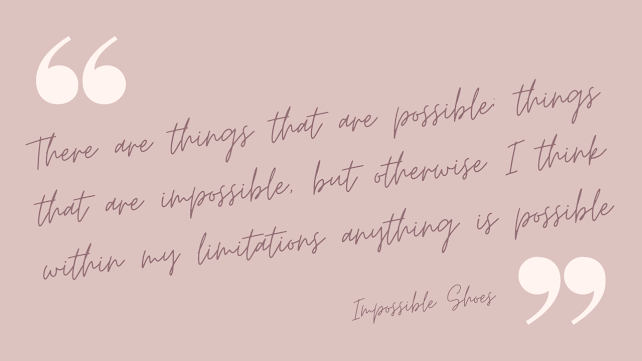I've been listening to a mindfulness meditation series on Headspace about self-compassion. In each meditation the narrator gets you to repeat to yourself the following affirmations:
"May I accept who I am", "May I love myself as I am" and "May be at ease with who I am"
At first I found this hard to really take in. I don't love, accept or feel at ease with myself. Part of this was about my disabilities as it's taken me a long time to accept my chronic health problems into my life. My disabilities have made it hard to love myself as I am now and equally to be at ease with myself and my disabilities and all that comes along with having disabilities and chronic health problems.
It can be hard to love a broken body and mind; especially one that can't be fixed. So in the absence of being able to fix my brokenness I must learn to love myself as I am and accept my brokenness and also be at ease living inside a broken body and mind.
Kintsugi, 金継ぎ, is the Japanese art of putting broken pottery pieces back together with gold — built on the idea that in embracing flaws and imperfections, you can create an even stronger, more beautiful piece of art.
 |
| The Kintsugi bowl I made |
Something I did a while back with my therapist was to make a Kintsugi bowl. It was a kit my therapist had bought for me, which was such a lovely3 thing for her to do for me and was so kind of her.
The small bowl was whole. I then had to break the bowl, which I tried to do artfully, ensuring that the bowl was broken in a particular way. With my own physical and mental brokenness there was no artful way in which I have become broken.
Once I felt happy with my artfully broken bowl I set out to fix it, but to fix it in a way that would make the bowl more beautiful for having been broken. I mixed up a combination of glue and gold powder to make a golden glue to piece back together my now broken bowl. When I reflected with my therapist about how I glued to bowl back together my therapist pointed out to me about how I glued the bowl back together (therapists have to analyse everything (!) but it can be helpful at times and even I'm analysing in this post!). I didn't rush putting my broken bowl back together I carefully applied the glue, like how I care for my own broken pieces. I applied the amount of glue that I wanted. Remembering back to this therapy session I remember how I wanted enough glue so that it was visible and showed through the cracks of the differs ceramic shards. It was a carefully chosen process. With my own brokenness some of my cracks are invisible; my pain and exhaustion and struggles with mental illness cannot be seen but at the same time I also have scars on my body that are visible but I choose to hide.
The whole process of braking the bowl and then putting it back together made me think of my own body and mind's brokenness. I feel like throughout my whole life I've been broken in one way or another and smashed apart as I've gone through my life both by other people around me but also due to physical and mental illness.
In therapy over the years I've often stated how I feel that I'm broken into a million pieces and 'too broken to be fixed'. Unlike how I artfully broke the bowl I've never had any control over how my mind and body has broken and because of this it's been difficult to piece myself back together. Therapy I would say is the thing that's held my brokenness the most over the years. Sure inpatient and day patient treatment (both psychiatric units and medical admissions) has kept me safe and in all honesty alive, but even my times in hospital have added to my brokenness from so of the things I experienced as a patient. Then there is the medication I take both for my physical symptoms and also my two psychiatric medications. Medication just enables me to manage my physical and mental health symptoms to allow me to just get through the day.Therapy isn't for everyone but for me over the years therapy (most of the time) has been what has held me together the most to stop my broken pieces being blown away in the wind.
Going back to the kintsugi bowl I did with my therapist a few months ago massively helped me. It was such a simple thing that me and my therapist did together but it really helped me to accept my physical and mental brokenness but how in time I can piece my life back together. I will never be whole and unbroken again; I will always have to deal with being physically and mentally unwell. However out my brokenness and with time my broken pieces will come together and what I've learnt over that time in life and in therapy I can turn my brokenness into some better and create something positive. I can use my brokenness for example to help others, like I hope I do through my blog and what I share over on my YouTube channel and also through things like voluntary work and the support I give to my friends and others around me and hopefully in the future when/if I'm able to work. I can use my lived experience to my advantage and turn negatives into positives which I feel I already have done.
As well as helping others inwardly I can turn my brokenness into something beautiful. There is no cure for my physical and mental illnesses but as I was putting my kintsugi bowl together I realised that in my own self I can develop a better attitude and learn to accept my brokenness and learn to love myself including the broken parts and also to live and be a ease with my brokenness. By doing this I can start to feel whole, glued back together with gold.
I keep my kintsugi bowl next to my bed and put random bits on bobs in it but every time I see the bowl it reminds me that in time my body and mind can become like that bowl, broken but whole held together with something beautiful.














